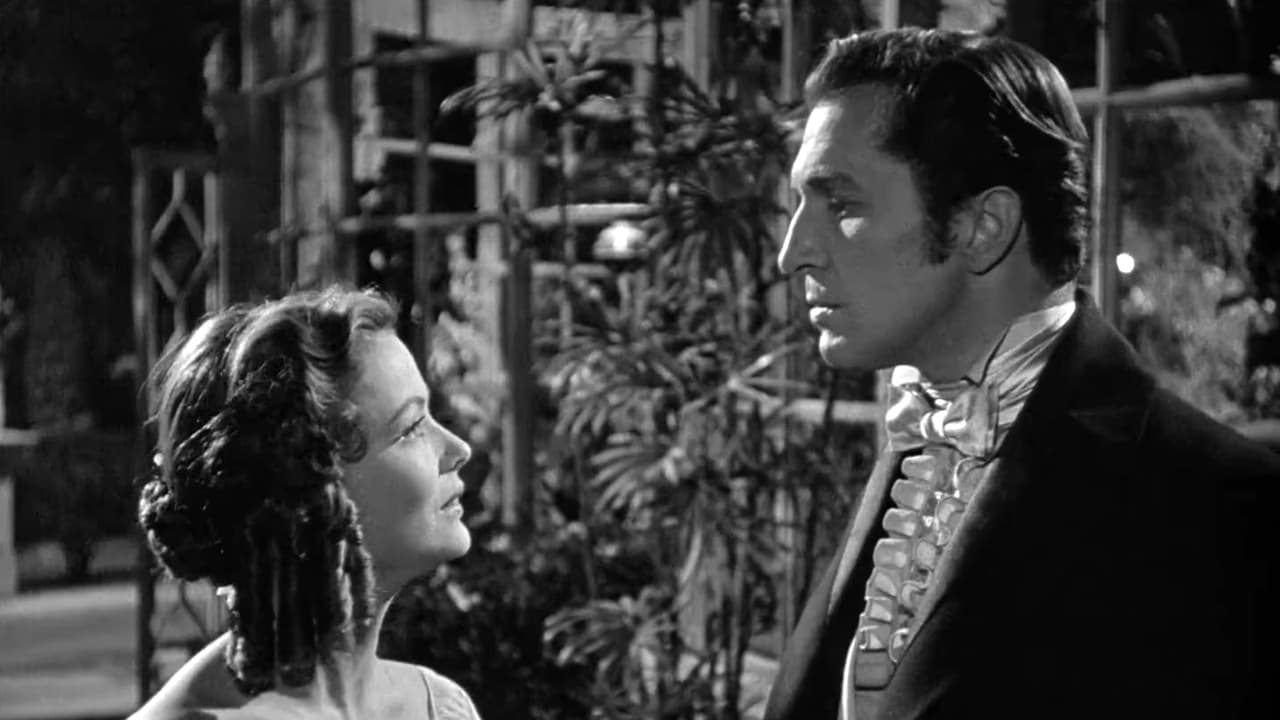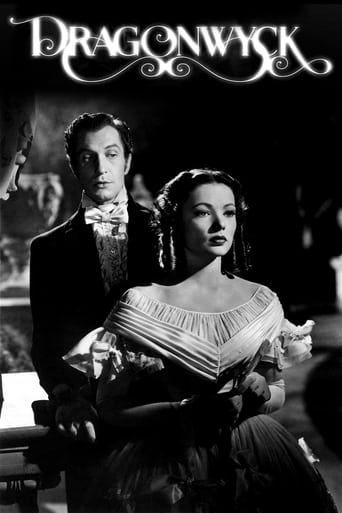

Boring
... View MoreWhat a freaking movie. So many twists and turns. Absolutely intense from start to finish.
... View MoreAlthough it has its amusing moments, in eneral the plot does not convince.
... View MoreFanciful, disturbing, and wildly original, it announces the arrival of a fresh, bold voice in American cinema.
... View MoreThis Gothic drama is set primarily in the upper Hudson valley in the castle-like manor house of Dragonwyck, beginning in the year 1844. It's based on the novel of the same name. It seems evident that this estate is modeled after the huge estate which was derived from the Dutch feudal-like estate Rensselaerswijck. Dragonwyck suggests to me its late medieval origins, with perhaps an ominous master or wife. Clearly, that master: Nicholas van Ryn(Vincent Price), still thought of himself as a feudal lord, and the maintenance of that status for himself and a hopeful successor seemed to be his chief purpose in life. Thus, he is the natural villain of the story. The hero is Dr. Jeff Turner(Glenn Langan), who is the self-appointed leader of rebellion by the many tenant farmers. He also saves the heroine: Miranda Wells(Gene Tierney), from an untimely death by poisoning by her husband, Nicholas. Initially, Miranda had been chosen to be the new governess for the daughter(Katrine) of Nicholas and his wife Johanna(Vivienne Osborne). But, after Nicholas secretly poisoned Johanna, he soon asked Miranda to marry him. He was desperate to have a son so that his estate could be passed on to his heirs. Johanna had provided him with a daughter, instead of a son, and was constitutionally unable to have further children. Besides, the two had never been happy together. Thus, it was time to replace her with a younger, prettier, woman who could bare him a son. But, Miranda, her successor, also failed, initially. She bore a son, but with a defective heart, who soon died. Apparently, Nicholas decided she must be cursed, thus must be done away with, for another replacement. Besides being cruel to his wives and child, and to his tenants, he complained that the new maid that Miranda had chosen was unworthy because she had a bad limp. Miranda pointed out that this was how God planned her to be, not being her own fault. When he lost his son, and a new law was passed giving his tenants the right to buy the land they had been tilling, he saw his main purpose in life going down the drain. Thus, he shut himself up in a remote room in the manor and soothed his worries with opium, which made his behavior more bizarre. Inevitably, he would clash again with Dr. Turner in a final confrontation which would end his misery.I have several questions or comments about the screenplay:1)It seems odd that Nicholas should request that a distant small farmer relative he has never met, in rather distant Greenwich, Conn., should send him one of his daughters(how did he know he had daughters)to be governess to his daughter. He must have been planning even then that this girl would be his replacement wife. As it turned out, Nicholas seemed to be exactly what Miranda wanted in a husband and vice versa.2)Why was Oleander chosen as the mode of poisoning? The fact that Johanna dies soon after the plant was brought into her room suggests that a volatile component was involved. But the poisons are not volatile. They must be ingested. And it's not just of matter that the person succumbs within a few hours with no preliminary distressing symptoms. Thus, she probably should have made a commotion about her symptoms before dying.3)After Nicholas is shot dead, who inherits Dragonwyck? Doesn't Miranda, as his wife. Or weren't women allowed to own property in this circumstance? Or perhaps his daughter, if he so willed it? In any case, Miranda clearly has had enough of Dragonwyck, and returns to her native Greenwich. By the way, why did daughter Katrine disappear from the story not long after she was introduced? Was she sent to a boarding school?With these caveats, I can recommend this film for those interested in Gothic stories and history. See it at YouTube.
... View MoreConnecticut farm girl (Gene Tierney) goes to live with her wealthy cousin (Vincent Price) and his wife on their estate called Dragonwyck. As is pretty much the standard for people who live on estates in older films, these folks ain't right. The movie's strength lies in its great cast and Gothic ambiance. Vincent Price is good in a role very similar to others he would play in horror films later in his career. Gene Tierney is beautiful and plays her part well. Walter Huston, Anne Revere, Spring Byington, and Jessica Tandy offer solid support. Unfortunately, despite the cast and fine direction from Joseph L. Mankiewicz, it's a rather dull and predictable movie that fails to build any suspense or intrigue. Obviously fans of Price and Tierney will want to check it out for themselves. Gene is certainly gorgeous, so the movie has that going for it.
... View MoreGene Tierney, Vincent Price and Walter Huston and Joseph L Mankiewicz were reasons enough to maintain interest in seeing Dragonwyck. While I had no problem with any of them, I did have a fair lot of issues with the film. The film is overlong and is rather ponderously paced. It further suffers from some clumsy scripting, a consequence of trying to cram too many different genres, and a story that has some suspense but suffers from the fact that it doesn't go anywhere for a bit of the time and the ending underwhelmed also. However, the production values are simply gorgeous, and the score is resolutely haunting. Mankiewicz's direction is solid. Gene Tierney looks beautiful and is adorable and touching. Walter Huston, Anne Revere and Jessica Tandy give terrific support. The best asset is the performance of Vincent Price, one that is devilishly handsome, sometimes frightening and always commanding. All in all, Price makes a deeply flawed movie worth watching. 6/10 Bethany Cox
... View MoreDragonwyck (1946)A high drama, historical drama, and drama drama. And the drama part works, so that's most of the movie. It's a fairly stiff arrangement, however, including the purposely stiff Vincent Price, who plays a noble Dutch American (a patroon) with a fabulous estate on the Hudson. Director Mankiewicz is great at nuanced characterizations, including a zealous father played by Walter Huston. This may not be his best product, but it's rich with details and lush textures both visually and in the narrative, and it gets more intense as the small events come to conflict by the end.What sometimes hobbles the whole thing is the simplified tenant farmer revolt, whatever its roots. (I live near to where this is fictionally set, and there is no trace of this kind of culture at all here, just some place names, and I have a suspicion it was never this exaggerated, not in the 1800s, though perhaps in the 1600s, when the Dutch really ruled the area, then called New Netherland.) The pageantry, the great house, the storms, and the big dances, all of this is romantic Bronte territory, well done, and great atmosphere. The music by Alfred Newman and the photography by Arthur C. Miller, both great talents at their professional best, do their usual best, as well.So what works best, beyond the overall mood, is the presence of the two women: the visiting niece of course, the star, Gene Tierney, and equally, in a subtle way, Connie Marshall, the suffering wife of the patroon. Tierney has a kind of cool reserve that works here, letting the light work on her pretty head. Eventually, the handsome doctor's role takes on more complex importance (played by Glenn Langan), and Price has a fine end, which Price fans will greatly admire.
... View More